ETIRA: Europe Needs Stronger Parcel Levies to Stop Illegal Cartridge Imports
December 16, 2025
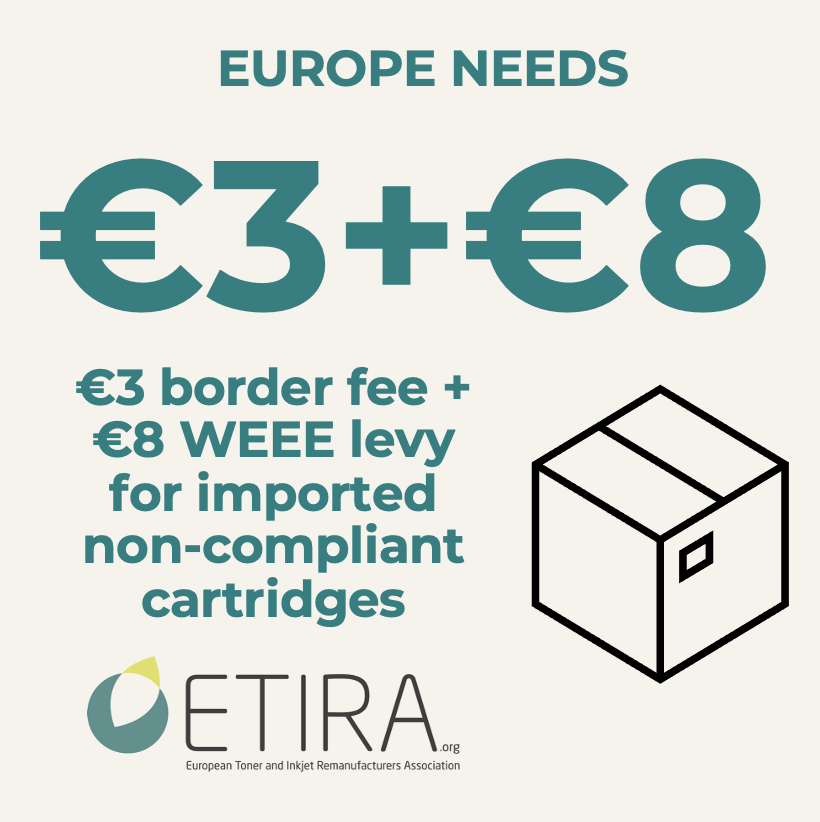
The European Union is preparing to introduce in 2026 a new €3 EU-wide handling fee on low-value imports, alongside a growing number of national charges in countries such as Italy and Romania. The measures are intended to curb the huge volume of small parcels entering the bloc, more than 90 per cent of which originate in China and which often bypass essential compliance checks.
ETIRA has welcomed the move as an essential acknowledgement that low-value parcels generate real costs, but warned that €3 alone is far too low to deter non-compliant imports of cheap, single-use cartridges. The association argues that restoring market balance requires a combined approach: a border handling fee, plus proper recovery of WEEE take-back and end-of-life costs currently absorbed by compliant European operators.
To illustrate the scale of that burden, ETIRA uses €8 as a realistic benchmark for the average cost of managing non-compliant cartridges at end of life. While a small inkjet cartridge may cost only a few cents to dispose of, a large 2kg toner cartridge can cost €14 or more. Across the mix of products entering Europe, the average cost borne by the compliant industry sits close to eight euros per cartridge.
A spokesperson for the association said,
“Low-value parcels are entering the EU at unprecedented scale, and a €3 handling fee is a step in the right direction. But €3 does not cover WEEE obligations or take-back costs. Restoring balance requires €3 at the border plus around €8 to cover the real end-of-life burden created by non-compliant cartridges. Without that, illegal and non-compliant imports will continue to shift costs onto compliant European businesses.”
The warning comes as EU companies increase pressure on Brussels to act more swiftly. Some national governments have already taken their own measures. Romania has proposed a fee of 25 lei, and Italy is preparing a parcel tax to shield domestic industries from unfair online competition. Retail groups have cautioned that a patchwork of national charges could undermine the single market.
Momentum for stricter parcel controls is also growing outside the EU. In the United Kingdom, the government announced in its 2025 Budget that it will abolish the existing de minimis exemption for low-value imports, which currently allows goods worth less than £135 to enter the country without customs duty. A formal consultation is now underway, with implementation planned by March 2029. UK industry federations have warned that the loophole is enabling a surge in cheap, non-compliant imports from Asia — concerns that closely mirror those raised by ETIRA in the European market.
ETIRA argues that the solution lies in harmonised EU rules combined with meaningful enforcement. Stronger customs checks, mandatory verification of authorised representatives, and alignment with WEEE and EPR producer registers are essential steps. Without them, the forthcoming Ecodesign framework for imaging equipment will struggle to deliver real environmental improvements.
“Europe is trying to build a circular economy, yet millions of new-build cartridges that do not comply with European standards are still slipping in under low-value thresholds every week,” ETIRA noted. “Recognising the problem with a €3 fee is a start, but only a combined approach that also recovers real WEEE and take-back costs will deliver lasting change,”
ETIRA will continue engaging with EU and national policymakers to ensure that parcel-levy reforms support Europe’s reuse industry and strengthen compliance across the imaging sector.
Tags
ComplianceLevy
WEEE
EU momentum grows for binding reuse targets
December 3, 2025
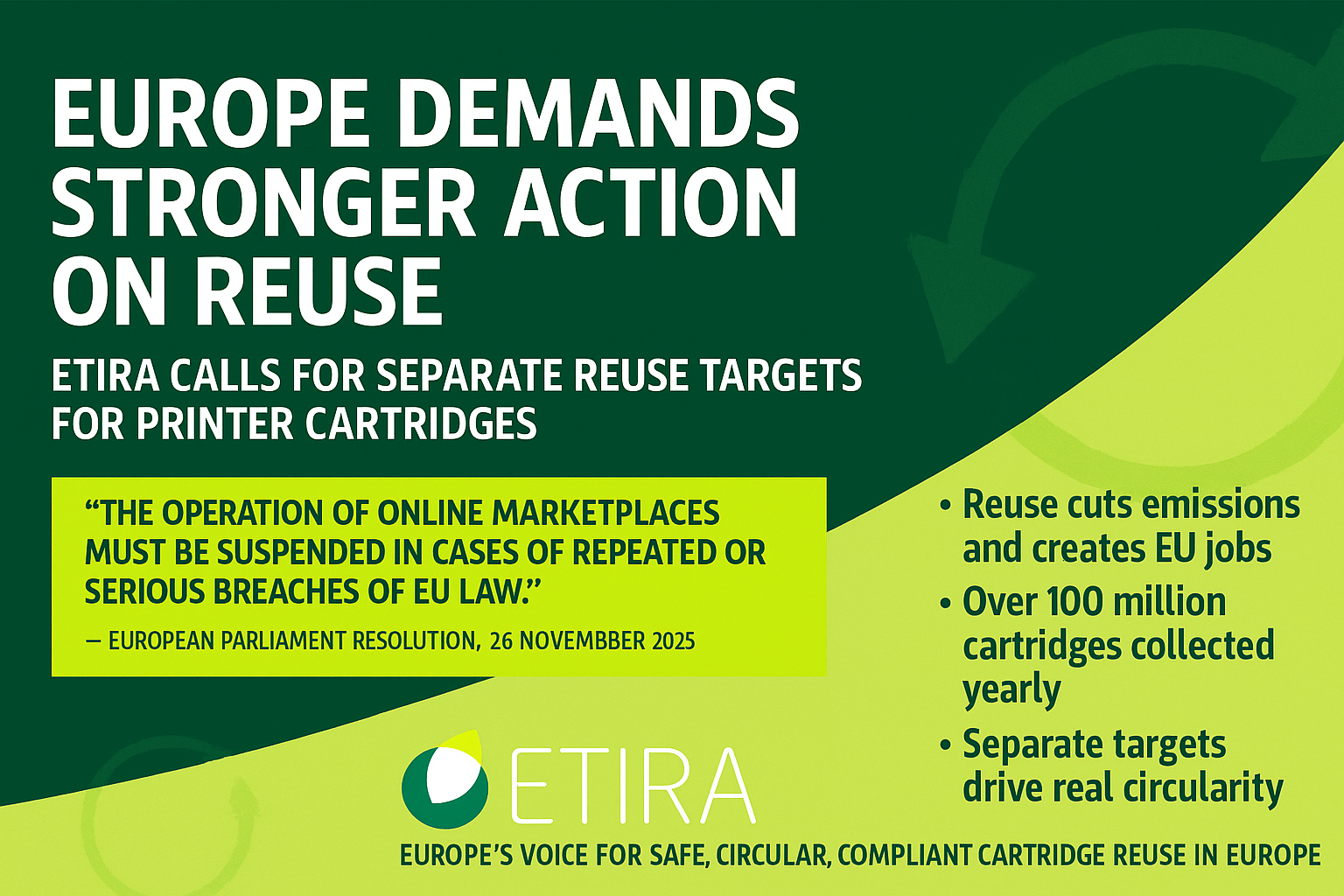
New RREUSE report reinforces ETIRA’s call for separate reuse targets for printer cartridges
The European policy landscape is shifting in favour of reuse. A major new report from RREUSE, Targets for Reuse and Preparing for Reuse in the European Union, provides strong evidence that Europe needs separate, binding reuse targets across key product streams. This includes WEEE items such as printer cartridges, where the absence of dedicated reuse targets continues to undermine the waste hierarchy.
For ETIRA, the findings confirm what we have long argued. Recycling-only targets disadvantage reuse, create perverse incentives, and prevent the EU from capturing the environmental and social benefits of remanufacturing. With over 100 million toner cartridges collected each year in Europe, the introduction of cartridge-specific reuse and preparing-for-reuse targets is realistic, measurable, and urgently needed.
RREUSE findings validate ETIRA’s longstanding concerns
The RREUSE report makes several key points that directly support ETIRA’s policy position:
- Combined reuse and recycling targets do not work
The report notes that mixed targets incentivise recycling at the expense of reuse. This contradicts the waste hierarchy, which places preparing for reuse above recycling. RREUSE therefore calls for separate targets across all major product streams including WEEE. - WEEE reuse remains neglected
Despite years of discussion, the WEEE Directive still does not include dedicated reuse targets. RREUSE highlights the structural issue: EPR schemes tend to focus on recycling because it is easier and cheaper, leaving reuse operators underfunded and with limited access to the waste stream. For printer cartridges, this problem is acute and long recognised by ETIRA. - Evidence from Member States shows reuse targets are feasible
Flanders, France, the Netherlands, Ireland and others have already introduced reuse targets at regional or national level. Their experience shows that targets improve access to reusable goods, attract investment in reuse infrastructure, and deliver measurable climate benefits. - Reuse delivers major environmental and social gains
The report links reuse to significant reductions in CO₂ emissions and strong job creation potential, especially when implemented by social enterprises. These benefits apply equally to cartridge remanufacturing, which offers both carbon savings and local employment.
A shifting political environment
The publication comes at a moment of wider political momentum. In its 26 November 2025 resolution on unsafe and illegal products circulating on online marketplaces, the European Parliament demanded stronger and faster enforcement, including temporary suspension of non-compliant platforms in cases of repeated or systemic breaches.
This is directly relevant to the printer cartridge market. Non-EU sellers who disregard EU rules distort competition and undermine legitimate reuse operators. ETIRA therefore supports the Parliament’s call for decisive action, including coordinated EU enforcement and stronger obligations for platforms that place products on the market.
What this means for remanufactured printer cartridges
Printer cartridges have long been recognised by the Commission and the Parliament as priority consumables with high reuse value. Yet:
- There is no separate reuse or preparing-for-reuse target for cartridges under WEEE
- EPR schemes focus heavily on recycling rather than reuse
- Non-compliant imports continue to undermine legitimate EU operators
- Reuse data for cartridges is not adequately captured
The RREUSE report strengthens the argument that these gaps must be closed in the forthcoming review of the WEEE Directive.
ETIRA’s position
ETIRA calls on the European Commission to take the following steps within the upcoming legislative cycle:
- Introduce separate reuse and preparing-for-reuse targets for printer cartridges under the revised WEEE Directive.
- Require EPR schemes to finance preparing-for-reuse activities, not only recycling, in line with the waste hierarchy.
- Guarantee access to reusable cartridges for accredited reuse operators across Europe.
- Strengthen monitoring and reporting to ensure that cartridge reuse is measured accurately and consistently.
- Ensure consistent EU-level enforcement against non-compliant imports and platforms offering illegal or dangerous products.
These measures would deliver meaningful environmental gains, support the circular economy, and protect consumers while strengthening the legitimate remanufacturing industry.
Next steps
ETIRA will use the findings from the RREUSE report in its ongoing dialogue with DG Environment, the European Parliament, and national authorities. As the WEEE review progresses, ETIRA will advocate for cartridge-specific reuse targets as a practical and effective way to raise circularity and reduce waste across Europe.
ETIRA Board meets in Italy and visits Ecomondo 2025
November 10, 2025
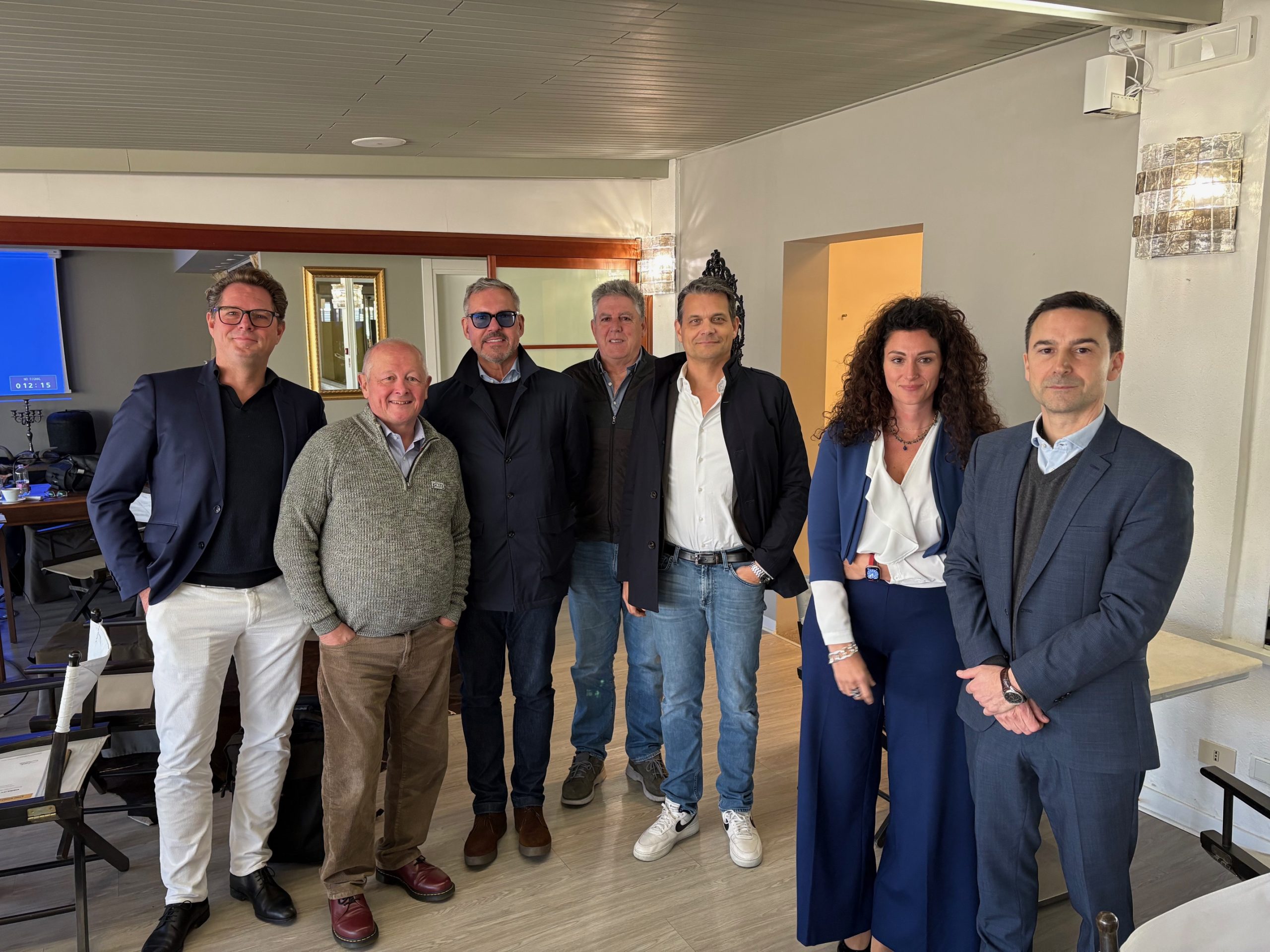
On 5–6 November, the ETIRA Board of Directors met in Italy for its annual face-to-face meeting. This year, the session was combined with a visit to Ecomondo, the leading European exhibition for the green and circular economy, held annually at the Rimini Expo Centre.
Ecomondo brings together industrial groups, policymakers, stakeholders, opinion leaders, local authorities, research bodies, and institutions to assess strategies for the development of EU environmental policy. ETIRA Board members used the opportunity to engage with reuse organisations and Italian ecolabel bodies during their visit.
While in Rimini, the Board discussed the challenging market conditions faced by ETIRA members. To support its members, the association reaffirmed its commitment to fighting non-compliant new-build cartridges and will intensify outreach to authorities to help stop illegal imports at EU borders. ETIRA will also continue to inform customers about the risks of trading non-compliant, non-OEM products.
The Board also reviewed ETIRA’s 2026 PR strategy and trade show participation, and looked forward to the forthcoming publication of the Impact Assessment for the EU’s proposed Ecodesign Regulation for imaging equipment and cartridges. Under this future regulation, OEMs will be required to share firmware and software data with recognised repairers and remanufacturers for a reasonable fee — a key step forward for fair competition and sustainability.
ETIRA comments on EU plans for Circular Economy Act
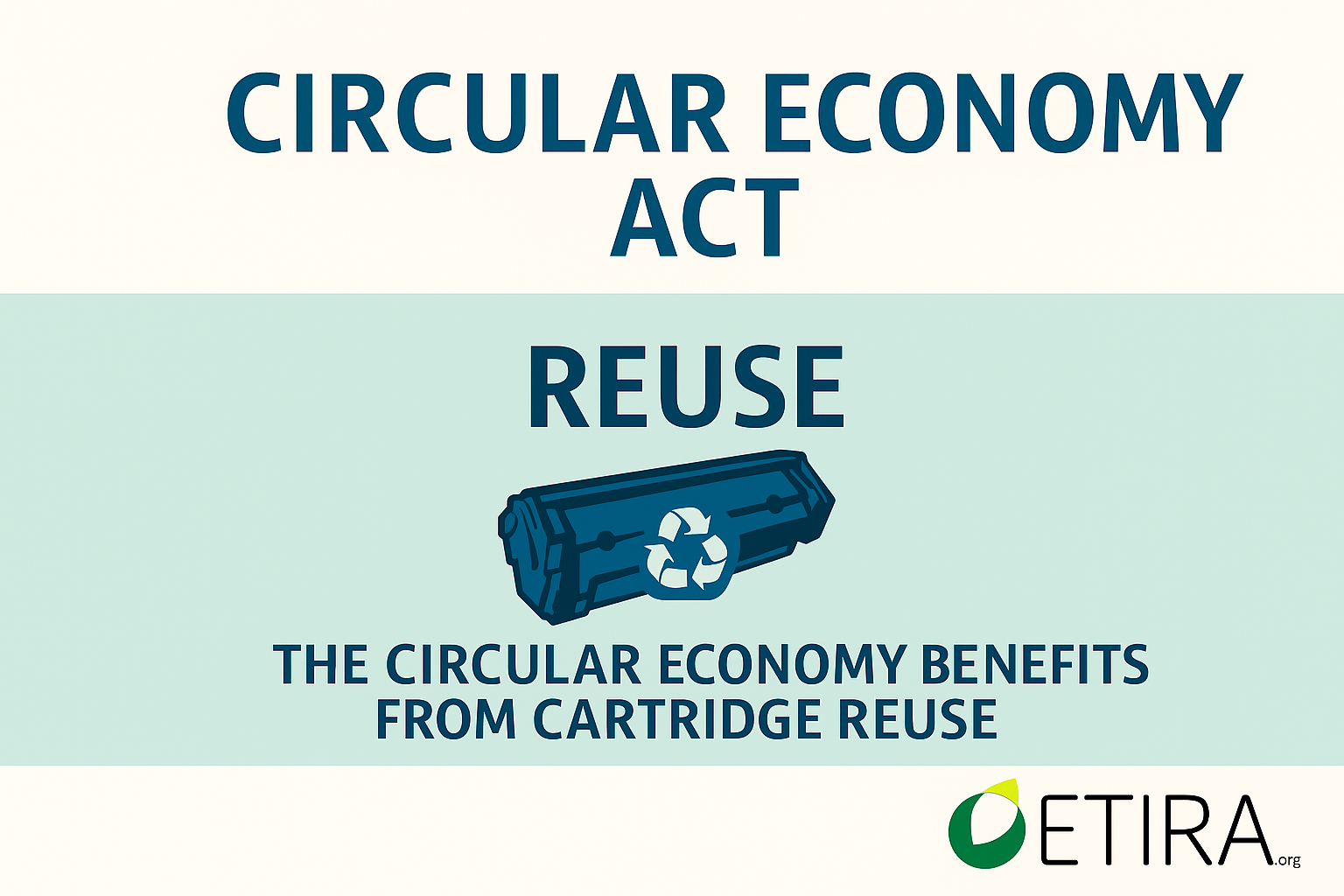
The European Union is preparing a Circular Economy Act to enhance Europe’s economic security and competitiveness, while promoting more sustainable production, circular business models, and decarbonisation. The Act aims to facilitate the free movement of circular products, secondary raw materials, and waste. It will also increase the supply of high-quality recycled materials and stimulate demand for these materials across the EU.
Before drafting the law, the European Commission is calling for input from stakeholders. ETIRA has therefore urged the EU to provide urgent regulatory support for the reuse of cartridges as cartridges.
Our industry is under existential pressure, not only due to anti-reuse practices by original equipment manufacturers (OEMs), but also because of the surge of cheap, polluting, non-OEM single-use cartridges (SUCs) flooding into Europe from Southeast Asia.
ETIRA calls for immediate EU action to remove OEM barriers to cartridge reuse, including restrictions on access to empties. Third-party remanufacturers must have full and unrestricted access to OEM software, and printer firmware updates must not block the use of remanufactured cartridges. Furthermore, non-reusable, cheap, polluting SUCs should be banned from the EU market.
Public bodies should lead by example in promoting the reuse of cartridges. ETIRA therefore calls for the EU’s Green Public Procurement (GPP) criteria to be made mandatory.
The EU WEEE Directive should also be revised to include a dedicated target for the reuse of cartridges.
Finally, in EU waste law, used cartridges should be classified as raw materials, not waste. Current waste transport rules at the EU, national, and regional levels create unnecessary barriers to the remanufacturing of cartridges. ETIRA urges that excessive licensing be reduced and that rules be harmonised across the EU at a low-risk level.
ETIRA welcomes EU and national parcel levies, calls for stronger compliance to protect Europe’s reuse industry
October 21, 2025
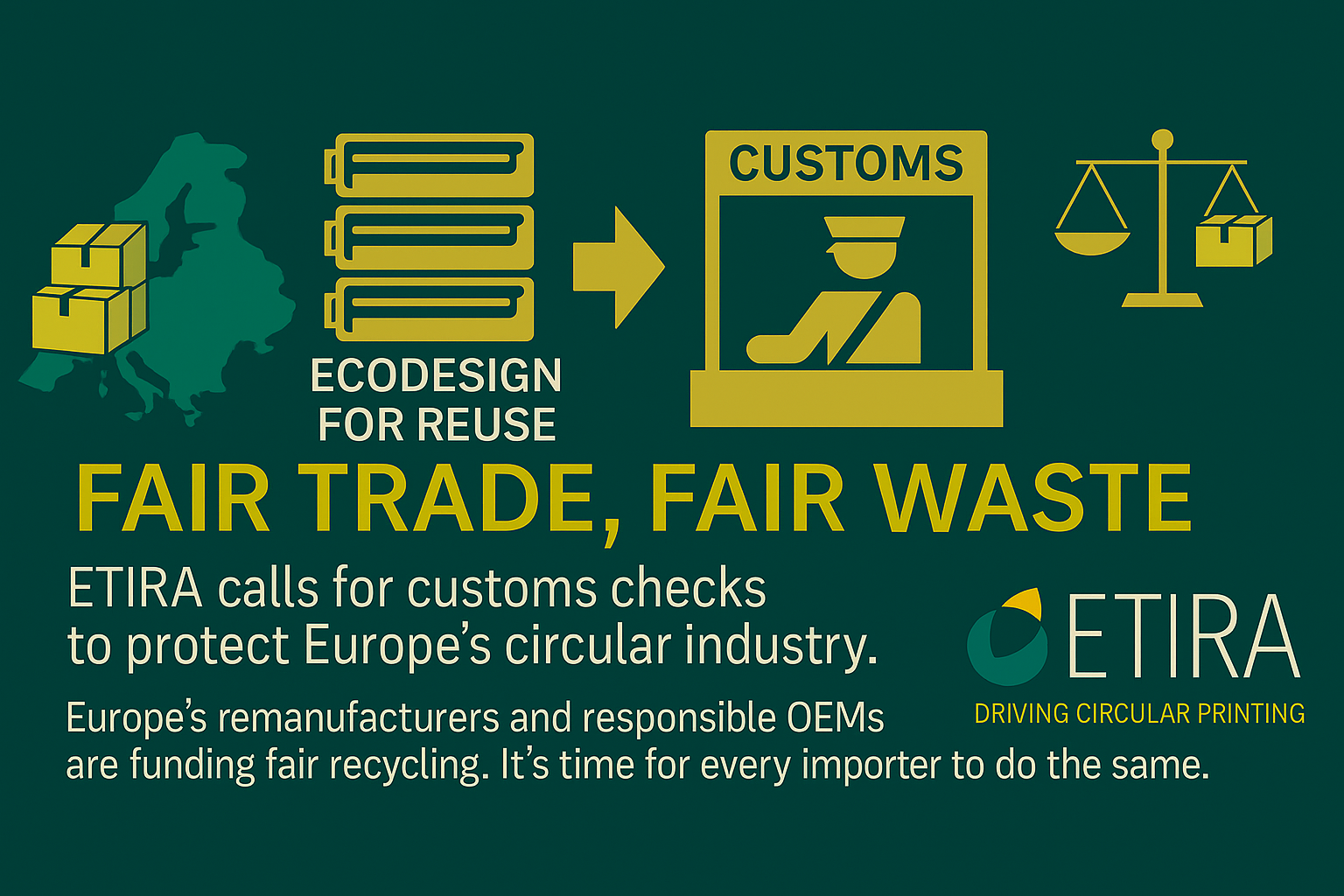
The European Toner & Inkjet Remanufacturers Association (ETIRA) has welcomed the European Commission’s plans to introduce a €2 flat handling fee on small parcels imported from outside the EU, alongside national initiatives such as Romania’s proposed RON 25 (€5) levy starting in November 2025. The Association says these steps mark an important move towards fairer trade and a more level playing field between European and non-EU producers.
However, ETIRA warns that while these levies will help recover lost VAT and customs revenues, they do not address the environmental loopholes that continue to undermine the EU’s circular economy goals — especially in the imaging and printing sector.
“We support the levies as a first step towards fair competition,” said ETIRA Secretary General Vincent van Dijk. “But the environmental costs of imported cartridges are far higher than €2 per parcel. The real cost of collecting and recycling these products within Europe is closer to €8 per unit. Unless importers also contribute their fair share to waste management, compliant European producers will keep paying for the waste of those who don’t.”
ETIRA argues that the EU already has the necessary legal framework to close this gap — it simply needs to be enforced. The Association is calling for customs authorities to cross-check small-parcel imports against national WEEE and EPR producer-registration databases, and to verify that non-EU manufacturers have a valid Authorised Representative (AR) established within the Union.
“The law already requires that any non-EU manufacturer placing products on the EU market has an authorised representative here, legally responsible for compliance,” van Dijk added. “If customs authorities checked that each import has a registered producer or AR before release, we’d instantly stop free-riders and hold someone accountable for non-compliance.”
Looking ahead, ETIRA welcomed the forthcoming Ecodesign for Imaging Equipment Regulationwhich will establish design and reuse requirements for printers and cartridges. The Association stressed that strong customs and compliance systems are essential to make this legislation effective.
“Ecodesign without enforcement will not deliver,” van Dijk concluded. “We urge the European Commission and Member States to coordinate customs, WEEE, and market-surveillance authorities so that only compliant, reusable products enter the EU market. The tools already exist, what’s needed now is the political will to use them. Europe’s circular economy depends on it.”
New EU Ecodesign Rules for Smartphones – A Glimpse into the Future for Printing Equipment
October 2, 2025
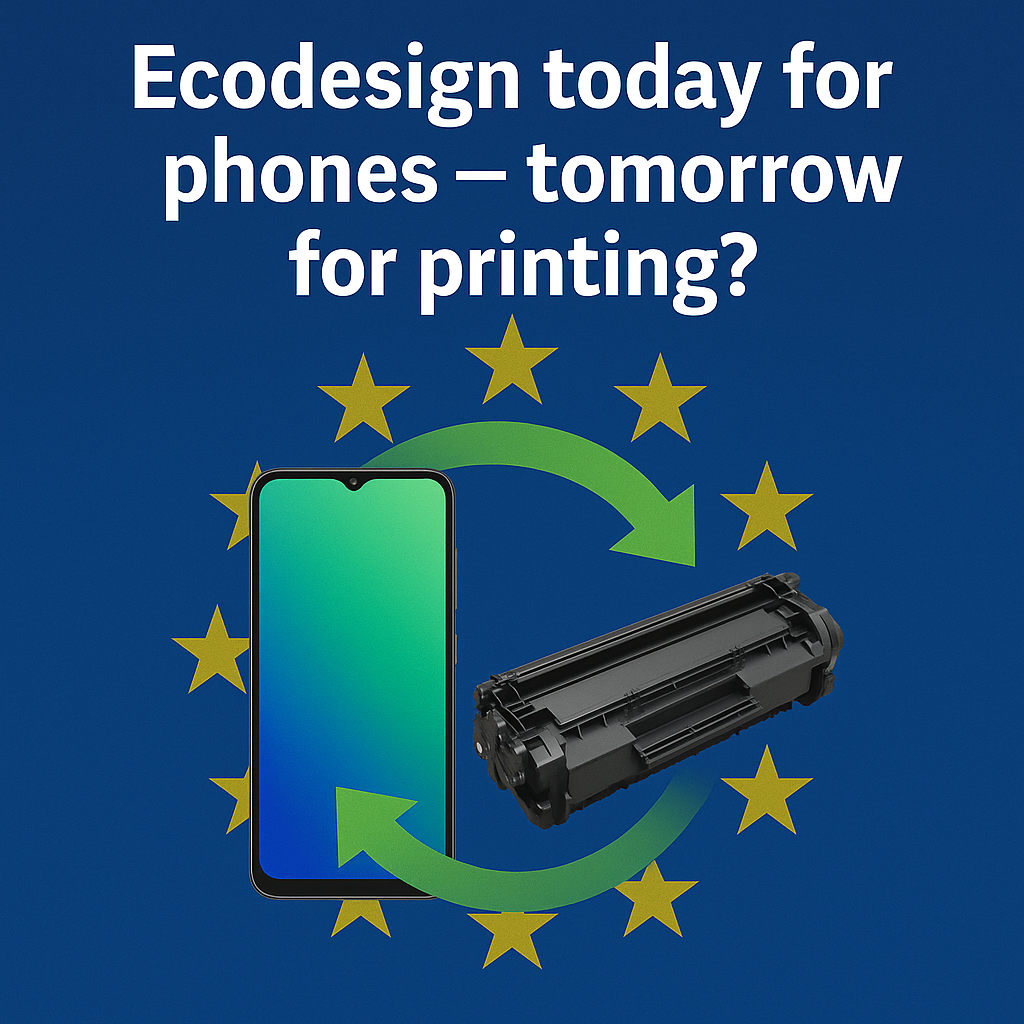
This summer, the EU’s new Ecodesign and Energy Labelling Regulations for mobile phones and tablets entered into force. From June 2025, smartphones, tablets, and other mobile devices placed on the EU market will need to comply with strict new requirements for energy efficiency, durability, reparability, and recyclability.
What’s new?
The regulations introduce a series of obligations for manufacturers and suppliers:
- Spare parts & repair: mandatory availability of key spare parts for up to 7 years, maximum delivery times, and easy access to repair and maintenance information.
- Durability & reuse: devices must meet standards for drop resistance, scratch resistance, dust and water protection, and battery endurance. They must also provide a secure factory reset to enable reuse.
- Recyclability: dismantling instructions and plastic marking requirements to improve recovery of critical raw materials.
- Energy labelling: smartphones and tablets will now carry an EU energy label, informing consumers about battery life, repairability, resistance to drops, and water protection.
- Market surveillance: suppliers must maintain technical documentation for 10 years and ensure products are CE-marked and fully traceable, with national authorities empowered to test and enforce compliance.
Why it matters for imaging equipment
For ETIRA, these new rules provide a preview of what may come for our industry. Concepts such as mandatory spare parts availability, design for repair, preparation for reuse, dismantling information, and stronger market surveillance are highly relevant for printers and imaging consumables.
If similar rules are extended to imaging equipment, they could significantly strengthen the remanufacturing industry by:
- Ensuring fair access to repair information and spare parts.
- Supporting preparation for reuse as a standard compliance requirement.
- Closing loopholes that allow non-compliant, non-recyclable products to undercut responsible European remanufacturers.
ETIRA’s perspective
These measures reflect the EU’s growing commitment to the circular economy. For our sector, they offer a glimpse of a more level playing field where reusability, compliance, and sustainability are prioritised over cheap disposability. ETIRA will continue to follow these developments closely and advocate for similar, strong ecodesign rules for imaging equipment.
👉 Read more about the new smartphone and tablet rules on the EU product portal.
ETIRA joins coalition calling for stronger EU rules on online marketplaces
September 18, 2025
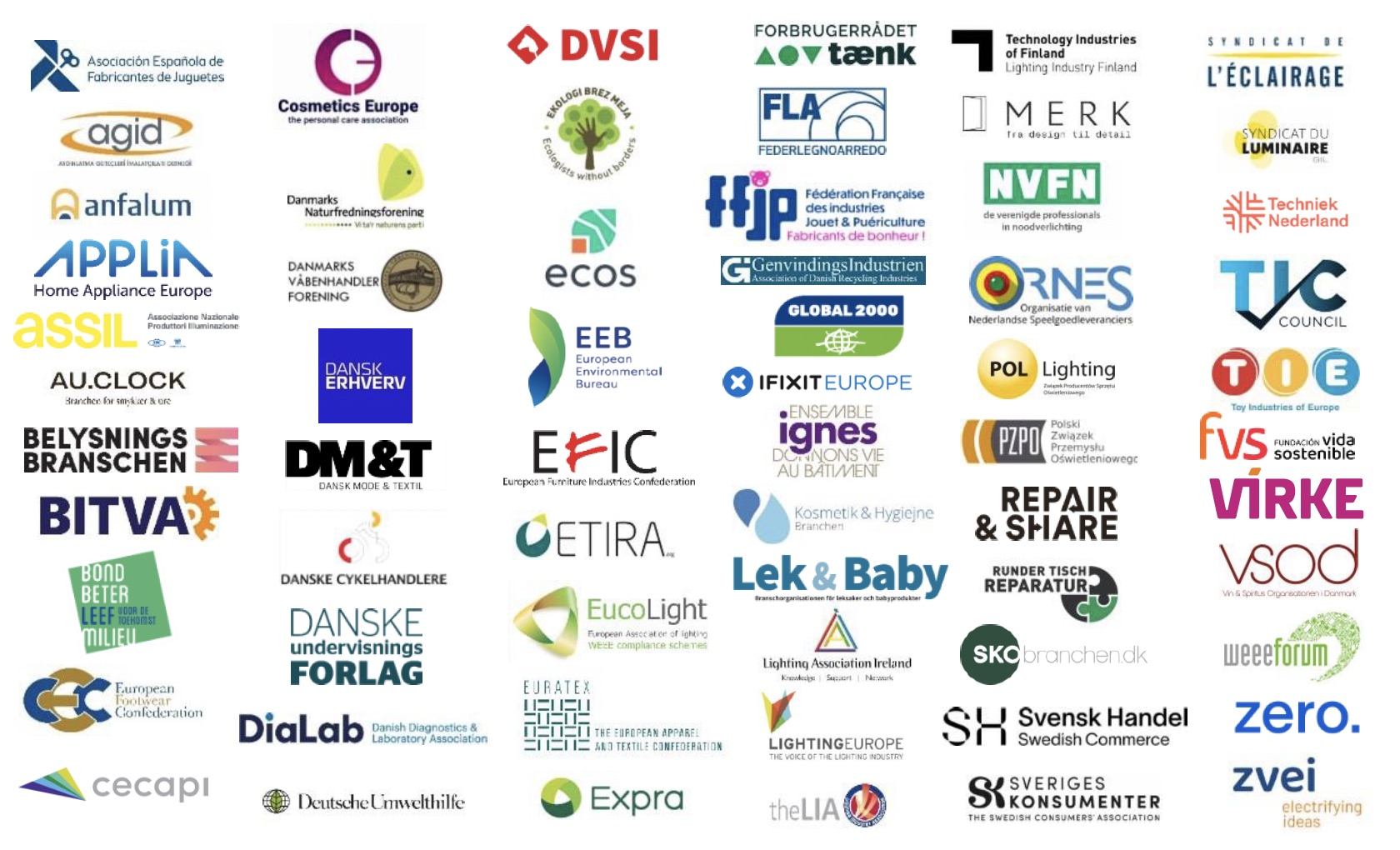
E-commerce has transformed the way Europeans buy everything from toys to tech to printer cartridges. Yet behind the convenience of a click lies a growing risk: unsafe and non-compliant products entering the EU market without proper oversight.
Every year, billions of small parcels arrive in the EU from third countries. According to the European Commission, 4.6 billion parcels under €150 entered the EU in 2023. Many of these bypass EU safety and compliance checks, exposing consumers to unsafe products, fake labels, and goods that do not meet sustainability requirements. In the printing sector, this includes toner and ink cartridges sold online without meeting EU safety, chemical or recycling rules.
Marketplaces Escape Accountability
Under current EU law, online marketplaces are not recognised as economic operators. This means they are not legally responsible for verifying compliance of products sold by third-country sellers on their platforms. They act only if notified of violations. Existing laws, such as the Digital Services Act (DSA) and the General Product Safety Regulation (GPSR), have not closed this gap.
Key Recommendations
To protect consumers, the environment, and fair competition, a coalition of 63 organisations – including ETIRA – calls for decisive action:
-
Mandatory EU economic operator for every product sold into the EU.
-
Recognition of marketplaces as economic operators responsible for third-country sales.
-
Enhanced obligations for marketplaces to verify compliance, ensure traceability, and uphold Extended Producer Responsibility (EPR).
-
Improved traceability via integration of EU databases and the Digital Product Passport.
-
Stronger customs checks and the swift abolition of the €150 de minimis exemption.
-
Reinforced enforcement resources for market surveillance and customs authorities.
A Call to Action
Closing these loopholes is essential to safeguard consumers, protect the environment, and ensure fair competition for businesses playing by the rules. For Europe’s remanufacturers, this is not only a question of fairness but also of sustainability: compliant, reusable cartridges should not be undercut by non-compliant imports that evade EU law.
ETIRA urges EU policymakers to act swiftly. Stronger rules will not only protect consumers but also support Europe’s circular economy and create a level playing field for responsible businesses.
Read all details and the full declaration here.
Tags
CircularEconomyFairCompetition
OnlineMarketplaces
ProductCompliance
WEEE Directive: Time for Ambitious Reuse Targets and Strong Enforcement
July 4, 2025
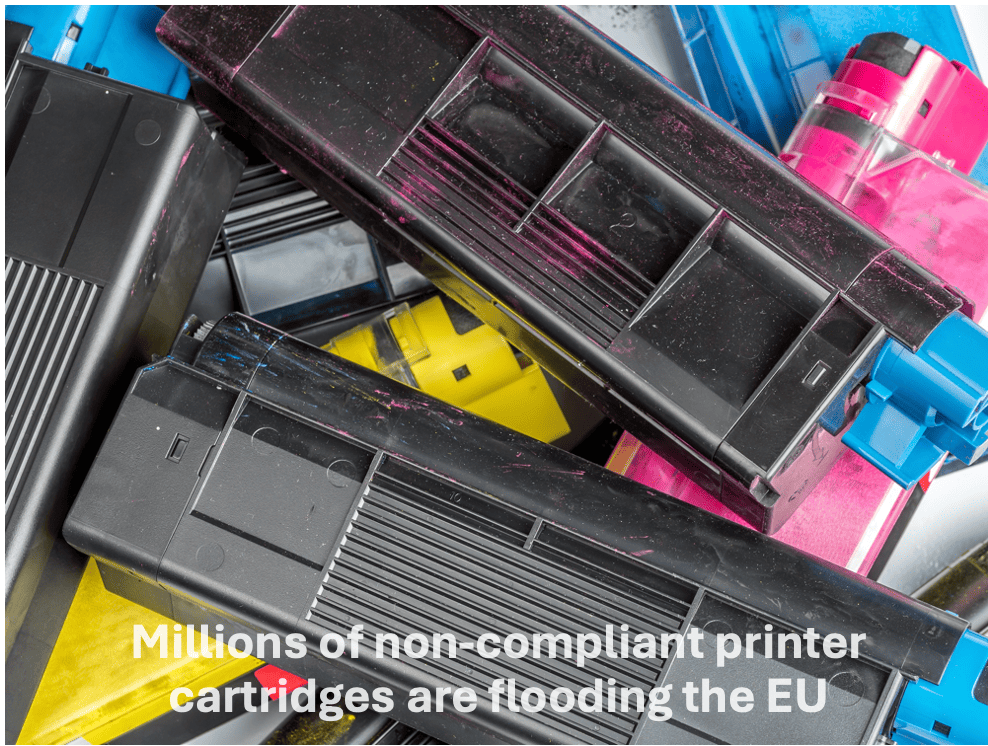
The European Commission’s newly published evaluation of the Waste Electrical and Electronic Equipment (WEEE) Directive confirms what ETIRA has long stated: the legislation is no longer fit for purpose. With collection targets widely missed, critical raw materials lost, and unfair competition distorting the market, the EU must act decisively to bring reuse and remanufacturing to the forefront of the circular economy.
“Linear manufacturers are not the right actors to lead the change,” said ETIRA President Javier Martinez. “WEEE keeps growing faster than it is being treated. In sectors with high circular potential, like imaging, we need to be bold — and we need to establish ambitious reuse targets now.”
The WEEE Directive, which governs the collection and treatment of electrical and electronic waste across the EU, has been in place for over two decades. While the Commission’s evaluation describes the legislation as “relevant, coherent and proportionate”, it also identifies five major shortcomings:
- Poor collection rates
- Limited recovery of critical raw materials (CRMs)
- Fragmented Extended Producer Responsibility (EPR) schemes
- Inconsistent treatment standards
- An outdated product scope
In 2022, only three Member States met the EU’s 65% collection target. Nearly half of the WEEE generated in the EU is not being collected. Valuable materials, such as copper, gallium, tungsten, and rare earths, continue to be lost to landfills and incineration.
For ETIRA and the imaging equipment reuse sector, these findings confirm that the current system disproportionately benefits single-use, linear models, especially new-build cartridges and printers that are imported into the EU without contributing to national EPR systems.
“For every single-use clone that enters, two reuse cycles are lost,” said Martinez. “The empty OEM cartridge is not reused, and the clone cannot be reused. That is devastating for circularity.”
Unfair competition from non-compliant, low-quality imports, often sold online, continues to undermine efforts by legitimate remanufacturers. The Commission itself flags the failure to enforce existing rules, particularly with online marketplaces. ETIRA has repeatedly raised this issue in relation to RoHS enforcement, with little tangible result.
“Voluntary compliance is not working. Enforcement must now be central to WEEE reform,” Martinez added. The new WEEE should create a separate category for cartridges, with a minimum reuse target of 30% -40%, gradually growing to 80%-90%. The technology and infrastructure to do that exists; what is missing is the economic incentive: our locally produced, environment-friendly alternative cannot compete with the thousands of polluting, cheap, single-use, non-OEM cartridges dumped on the EU market every day.
The evaluation also references the EU’s upcoming fully digital Waste Shipment System, which is expected to be implemented in 2026.
The WEEE Directive was a landmark moment for the imaging sector in 2001, and led to the creation of ETIRA the following year. Today, with the Circular Economy Act on the horizon, the EU has a second chance to get it right.
ETIRA stands ready to work with policymakers to ensure that the revised WEEE framework delivers:
✅ Strong reuse targets
✅ Strong enforcement
✅ Clear rules for high-quality remanufacturing
✅ A level playing field for all producers
Love Me, Tender?
July 2, 2025
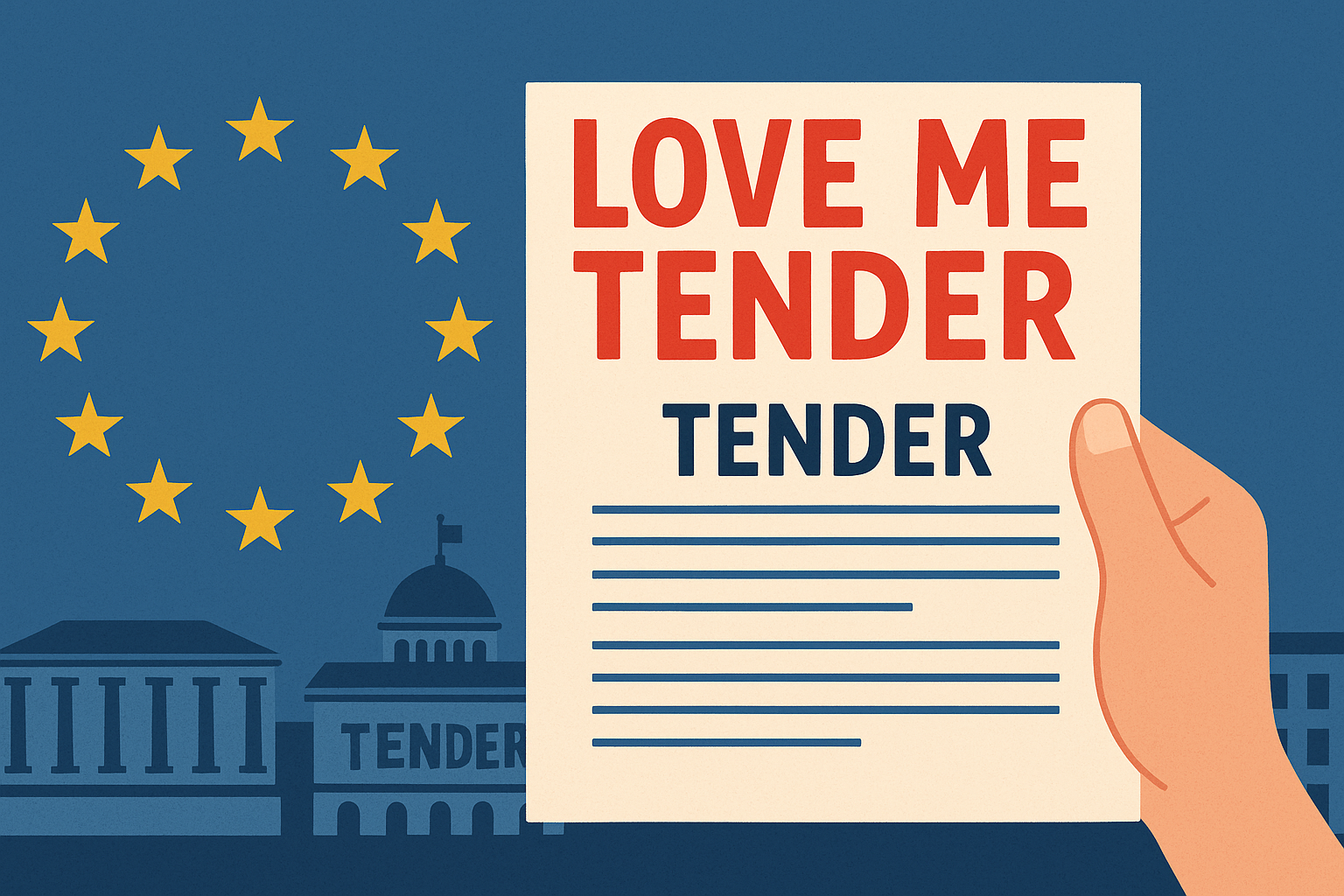
Public tenders for the procurement of imaging equipment and cartridges continue to present serious challenges for OEM cartridge remanufacturers. In the EU, the outright exclusion of remanufactured OEM cartridges from public tenders is illegal. Challenging such tenders is an ongoing task for ETIRA.
It is unacceptable that some public bodies violate EU competition law by preventing bidders from offering remanufactured OEM cartridges. ETIRA intervenes wherever we discover these unlawful exclusions. Over the past two years, ETIRA has formally protested against around 25 tenders in Germany, Spain, Italy, Romania and France, which initially excluded remanufactured cartridges. In most cases, the public authority backed down and eventually allowed remanufactured products to be included.
Other tender-related problems arise when unscrupulous traders abuse the system. In several recent cases, ETIRA exposed firms that won tenders by offering remanufactured cartridges on paper, only to supply polluting single-use cartridges instead. ETIRA notified the relevant authorities and demanded that the delivered products be tested for compliance with the tender criteria.
Abuse also includes the submission of false information to qualify for a tender. In one recent case in Italy, ETIRA exposed bidders who falsely claimed their products held Type-1 ecolabel certification.
If you have encountered similar issues, don’t hesitate to get in touch with info@etira.org to explore how ETIRA can assist you in responding.